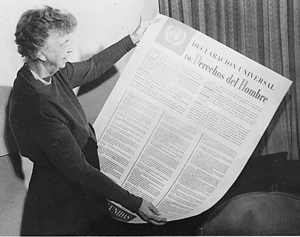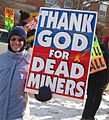Freedom of speech facts for kids

Freedom of speech is your right to share your thoughts, ideas, and opinions without being stopped or punished by the government. It's also known as freedom of expression. This important right also includes the idea of Freedom of information, which means being able to easily get and share information.
Why Free Speech Matters
Most people agree that freedom of speech is super important for a democratic government. In a democracy, people choose their leaders and help decide how their country is run.
- Governments listen: When people can speak freely, the government can hear their ideas. They learn about problems and what changes people want. This helps leaders make better choices for everyone.
- Prevents unfairness: If people are afraid to speak up, governments might not know what citizens need. Some governments might even stop free speech. They do this because they don't want to be criticized.
- Sharing ideas: A famous thinker named John Stuart Mill believed society needs to hear all kinds of ideas. Even unpopular ones can be helpful. This helps everyone learn, grow, and find new solutions.
Are There Limits to Free Speech?
Even in countries that strongly support free speech, there are usually some limits. You cannot say anything you want if it harms others or society.
For example:
- The U.S. Supreme Court once said it's against the law to falsely shout "fire!" in a crowded place. Why? Because it could cause panic and hurt people.
- International agreements say it's not okay to encourage racial or religious hatred.
- Many countries have laws against hate speech. This is speech that attacks a person or group. It is based on things like their race, religion, or background. These laws protect people from harm and discrimination.
Sometimes, people might feel pressured not to speak freely. This is not because of government rules. It's because of what their community or friends might think. If someone shares an unpopular opinion, they might face disapproval. This can make people hesitant to share their true thoughts.
Images for kids
-
Eleanor Roosevelt and the Universal Declaration of Human Rights (1948)—Article 19 says "Everyone has the right to freedom of opinion and expression."
-
An orator at Speakers' Corner in London, 1974. This is a famous place where people can speak freely on any topic.
-
A permanent Free Speech Wall in Charlottesville, Virginia, U.S., where people can write or draw their ideas.
-
Members of Westboro Baptist Church (pictured in 2006) were banned from entering Canada due to their hate speech.
-
The title page of Index Librorum Prohibitorum, or List of Prohibited Books, from Venice, 1564. This was a list of books the Catholic Church forbid people to read.
-
In 1596, a Dutch Bishop named Henric van Cuyck argued for censorship. He said that the printing press led to "harmful lies." He specifically mentioned the Talmud, the Qur'an, and writings by Martin Luther and Jean Calvin.
-
The first page of John Milton's 1644 book Areopagitica. He strongly argued against a law that required books to be approved before being published.
-
This 1688 edition of Golden Legend was censored. It followed the Index Librorum Expurgatorum of 1707. That list showed specific parts of books that needed to be removed.
-
A statue of George Orwell at the BBC headquarters. The wall behind it says, "If liberty means anything at all, it means the right to tell people what they do not want to hear." These words are from Orwell's book Animal Farm (1945).
See also
 In Spanish: Libertad de expresión para niños
In Spanish: Libertad de expresión para niños











